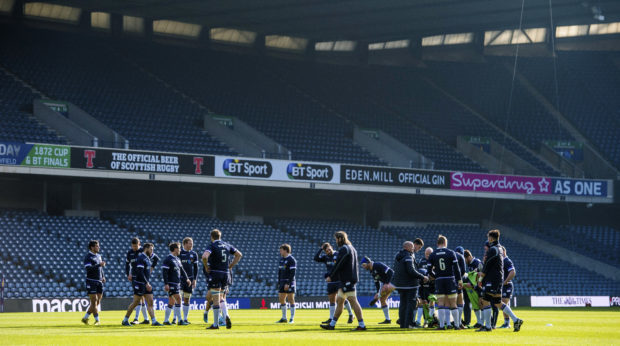If you are to believe Eddie Jones, Scotland is in a frenzy of expectant confidence ahead of today’s Calcutta Cup game, our only possible weakness being mental fatigue from all the mind games we’ve been playing all week.
The truth of course is a lot different. Had the Scots lived up to their billing in Cardiff three weeks ago, there would certainly have been a fevered expectation to the annual joust with the English today at BT Murrayfield.
But the Scots miserably, humiliatingly failed against Wales, and even a resilient victory over France didn’t put that right. There’s the usual excitement at England’s biennial appearance at EH12, of course, but also that familiar knife edge of hope and fear.
And fear was always going to be part of it. The 62 point demolition at Twickenham last year remains a raw wound for many, one that captain John Barclay feels won’t ever heal for him, personally, no matter if some kind of “revenge” is taken today.
The other aspect is that this England team, with 23 wins out of 24 games under Jones, is the nightmare of European rugby writ large – what would happen if England stopped messing up their obvious advantages in terms of player and financial resources and actually got organised properly?
As someone supposed to be professional rugby analyst, you can look at Wales and pinpoint weaknesses (even if Scotland couldn’t exploit them) and you can certainly look at France right now and spot them (which Scotland did eventually).
But England? Discipline at times? Jonathan Joseph is prone to go missing occasionally (although rarely against Scotland it seems). Mike Brown may be slightly past his prime. Anything else?
Scotland assistant coach Dan McFarland certainly thinks there are things Scotland can exploit today.
“We’re a team with a lot of balance, we do have variation in our game,” he said, answering the charge made by Jones that Scotland play from “side-to-side”.
“We do want to play fast rugby, we believe it suits our style of play. When we’re accurate, we’re good at it. That won’t change. We’ll be hoping to surprise England with the speed that we can play at.”
However there are elements within England’s gameplan and personnel that could cause the Scots some problems, although McFarland prefers a different description.
“It’s a challenge,” he said, in reference to the ballast England bring with three second rows in their pack, all of whom are proper-sized locks but also a good deal more dynamic and athletic than the norm.
“They’re challenge at the line-out and in their ability to ball carry, because they have good size. They are athletes as well so they are fit.
“That would be a key point. But we put our fitness right up there with the best. We will still be looking to play at a high tempo and, when the ball is in play, keep everybody moving.”
This worked in eventually sucking the life out of France but it’s hard to see it working against Launchbury, Itoje and Lawes, with George Kruis – a try scorer the last time England were at Murrayfield – in reserve. England’s powerful bench – “finishers” if you absolutely must – also ensures them 80 minute staying power.
England will certainly come at Scotland in the scrum, and although the Scots have repelled attacks in that area so far, the analysis of their effort against France showed Simon Berghan’s knees on the ground a little too often for it to be wholly circumstantial.
However Berghan’s mobility and tackling ability is absolutely essential against an England playmaking duo of George Ford and Owen Farrell skilled at identifying weak seams in defences manned by tight forwards.
England’s speed and variety of set plays, especially from lineouts, was a big factor in them slicing the Scottish defence to ribbons at Twickenham last year. It can’t be allowed to happen again if the home side are to stay competitive.
What hope is there? England have played conservatively at Murrayfield in recent visits, and may do so again – despite what Jones said prior to the championship, this was always their potentially most difficult game ahead of meeting Ireland on Super Saturday.
If Scotland can – cue the favourite phrase of English tyro Richard Cockerill, now Edinburgh coach – “stay in the fight” then England’s penchance for giving away penalties might help the Scots wrest an advantage through Greig Laidlaw’s boot.
But it needs a lot more. Stalwart defence, and a solid scrum. Finn Russell playing at the very top of his game. Tries, which have proved exceedingly hard to come by against England in Edinburgh.
Mind games won’t work, even if Scotland had actually tried them. Today is all about actions.


